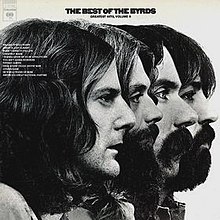
The Byrds were an American rock band formed in Los Angeles, California, in 1964. The band underwent multiple lineup changes throughout its existence, with frontman Roger McGuinn remaining the sole consistent member. Although their time as one of the most popular groups in the world only lasted for a short period in the mid-1960s, the Byrds are today considered by critics to be among the most influential rock acts of their era. Their signature blend of clear harmony singing and McGuinn's jangly twelve-string Rickenbacker guitar was "absorbed into the vocabulary of rock" and has continued to be influential.
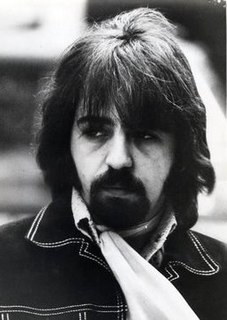
Clarence White was an American bluegrass and country guitarist and singer. He is best known as a member of the bluegrass ensemble the Kentucky Colonels and the rock band the Byrds, as well as for being a pioneer of the musical genre of country rock during the late 1960s.

Ballad of Easy Rider is the eighth album by the American rock band the Byrds and was released in November 1969 on Columbia Records. The album was named after the song "Ballad of Easy Rider", which had been written by the Byrds' guitarist and singer, Roger McGuinn, as the theme song for the 1969 film, Easy Rider. The title was also chosen in an attempt to capitalize on the commercial success of the film, although the majority of the music on the album had no connection with it. Nonetheless, the association with Easy Rider heightened the Byrds' public profile and resulted in Ballad of Easy Rider becoming the band's highest charting album for two years in the U.S.

The Byrds' Greatest Hits is the first greatest hits album by the American rock band the Byrds and was released in August 1967 on Columbia Records. It is the top-selling album in the Byrds' catalogue and reached number 6 on the Billboard Top LPs chart, but failed to chart in the UK.

Dr. Byrds & Mr. Hyde is the seventh studio album by the American rock band the Byrds and was released in March 1969 on Columbia Records. The album was produced by Bob Johnston and saw the band juxtaposing country rock material with psychedelic rock, giving the album a stylistic split-personality that was alluded to in its title. It was the first album to feature the new band line-up of Clarence White (guitar), Gene Parsons (drums), John York (bass), and founding member Roger McGuinn (guitar). Dr. Byrds & Mr. Hyde is unique within the band's discography for being the only album on which McGuinn sings the lead vocal on every track.
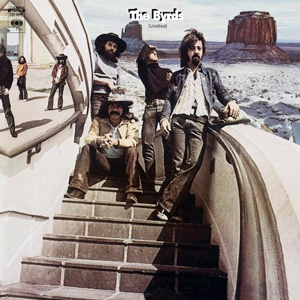
(Untitled) is the ninth album by the American rock band the Byrds and was released in September 1970 on Columbia Records. It is a double album, with the first LP featuring live concert recordings from early 1970, and a second disc consisting of new studio recordings. The album represented the first official release of any live recordings by the band, as well as the first appearance on a Byrds' record of new recruit Skip Battin, who had replaced the band's previous bass player, John York, in late 1969.
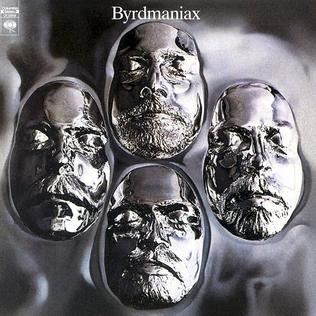
Byrdmaniax is the tenth album by the American rock band the Byrds. It was released in June 1971 on Columbia Records at a time of renewed commercial and critical success for the band, due to the positive reception that their two previous albums, Ballad of Easy Rider and (Untitled), had received. The album was the second by the Byrds to feature the Roger McGuinn, Clarence White, Gene Parsons, and Skip Battin line-up of the band and was mostly recorded in early 1971, while the band were in the midst of an exhausting tour schedule. As a result, the band had little time to hone their new songs before recording commenced and thus, much of the material on the album is underdeveloped. Byrdmaniax was poorly received upon release, particularly in the United States, and did much to undermine the Byrds' new-found popularity.

Farther Along is the eleventh album by the American rock band the Byrds and was released in November 1971 on Columbia Records. For the most part, the album was recorded and produced by the Byrds themselves in London, England, over the course of five work-intensive days in July 1971. It was quickly released as a reaction to the commercial failure of the Byrds' previous album, Byrdmaniax, and as an attempt to stem the criticism that album was receiving in the music press.

The Byrds is a four-CD box set by the American rock band the Byrds. It features music that had previously been released between the mid-1960s and early 1970s, along with a number of previously unreleased tracks and some new recordings from 1990. The box set was issued on October 19, 1990 by Columbia/Legacy and reached number 151 on the Billboard albums chart.

The Essential Byrds is a comprehensive two-CD compilation album by the American rock band the Byrds. It was released in 2003 as part of Sony BMG's The Essential series. The Essential Byrds did not chart in the U.S. or the UK. A 3.0 edition of the compilation released in 2011 contains a third disc with six additional tracks: "Spanish Harlem Incident", "I Knew I'd Want You", "The World Turns All Around Her", "I See You", "Change Is Now", and "One Hundred Years from Now".
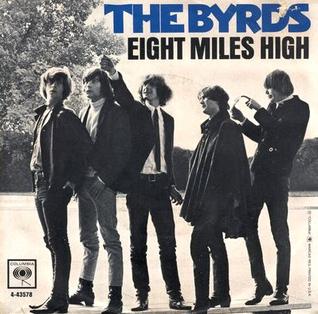
"Eight Miles High" is a song by the American rock band the Byrds, written by Gene Clark, Jim McGuinn, and David Crosby. It was first released as a single on March 14, 1966. Musically influenced by sitar player Ravi Shankar and jazz saxophonist John Coltrane, the song was influential in developing the musical styles of psychedelia and raga rock. Accordingly, critics often cite "Eight Miles High" as being the first bona fide psychedelic rock song, as well as a classic of the counterculture era.
"You Ain't Goin' Nowhere" is a song written by American musician Bob Dylan in 1967 in Woodstock, New York, during the self-imposed exile from public appearances that followed his July 29, 1966 motorcycle accident. A recording of Dylan performing the song in September 1971 was released on the Bob Dylan's Greatest Hits Vol. II album in November of that year, marking the first official release of the song by its author. Earlier 1967 recordings of the song, performed by Dylan and the Band, were issued on the 1975 album The Basement Tapes and the 2014 album The Bootleg Series Vol. 11: The Basement Tapes Complete.

There Is a Season is a four-CD and one DVD box set by the American rock band the Byrds that was released on September 26, 2006 by Columbia/Legacy. It comprises 99 tracks and includes material from every one of the band's twelve studio albums, presented in roughly chronological order. The bonus DVD features ten clips of the Byrds lip-synching their hits on television programs between 1965 and 1967. Upon release, the box set failed to reach the Billboard 200 chart or the UK Albums Chart. There Is a Season supplants the band's earlier box set, The Byrds, which was released in October 1990.

The Very Best of The Byrds is a compilation album by the American rock band The Byrds, released by Columbia Records in 1997. Initially the compilation was only released in Europe and Canada but as of 2006, the album has seen some release in the U.S. The album contains a total of 27 songs, arranged in chronological order, that span the first five years of the band's career.
"Ballad of Easy Rider" is a song written by Roger McGuinn, with input from Bob Dylan, for the 1969 film, Easy Rider. The song was initially released in August 1969 on the Easy Rider soundtrack album as a Roger McGuinn solo performance. It was later issued in an alternate version as a single by McGuinn's band the Byrds on October 1, 1969. Senior editor for Rolling Stone magazine, David Fricke, has described the song as perfectly capturing the social mood of late 1969 and highlighting "the weary blues and dashed expectations of a decade's worth of social insurrection".
"Triad" is a song written by singer-songwriter David Crosby in 1967 about a ménage à trois. It was recorded by the Byrds that year, while Crosby was a member of the band, but their version went unreleased at the time and was not issued until twenty years later. Jefferson Airplane released a version of the song in 1968 on their Crown of Creation album and a live version performed by Crosby was included on Crosby, Stills, Nash & Young's 4 Way Street in 1971.

"It Won't Be Wrong" is a song by the American folk rock band the Byrds, which appeared as the second track on their 1965 album, Turn! Turn! Turn! It was also coupled with the song "Set You Free This Time" for a single release in 1966, resulting in "It Won't Be Wrong" charting at number 63 on the Billboard Hot 100. The song was written by Byrds band member Jim McGuinn and his friend Harvey Gerst in 1964.

The Byrds' Greatest Hits Volume II is the second greatest hits album by the American rock band the Byrds. It was released in the United Kingdom and Europe on October 29, 1971, by CBS Records as a follow-up to the band's first compilation album, The Byrds' Greatest Hits. The album appeared following the band's successful appearance at the Lincoln Folk Festival in England on July 24, 1971, and according to band biographer Johnny Rogan may have been issued by CBS as a reaction to the band's previous studio album, Byrdmaniax, having failed to chart in the UK.

Live at Royal Albert Hall is a live album by the American rock band the Byrds, released in 2008 on Sundazed Records. The album consists of recordings from the band's appearance at the Royal Albert Hall in London, England on May 13, 1971. Although the tapes had been in lead guitarist Roger McGuinn's possession since the concert took place, the album represents the first official release of all tracks. In addition to the regular CD release, Live at Royal Albert Hall 1971 was also released as a double album vinyl LP.

History of The Byrds is a double album compilation by the American rock band the Byrds and was released on May 18, 1973 by CBS Records. The compilation was released exclusively in Europe and the UK, peaking at number 47 on the UK Albums Chart, but it was also available in the United States as an import.
